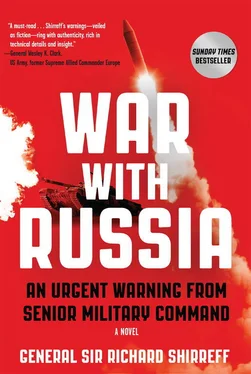Yes, they had HMS Astute , the hunter-killer submarine, operating independently ahead of the Task Group, but she was probably sneaking around off the coast of Kaliningrad—two hundred nautical miles to the east—keeping an eye on what was coming out of Baltiysk, the main base of Russia’s Baltic Sea Fleet. That left only one anti-sub escort covering the whole Task Group, which was taking one hell of a gamble, like placing all your chips on one number at roulette, and Bush was not a betting man. That said, he had to assume that the politicians, advised by the spooks and the admirals, knew what they were doing.
Queen Elizabeth was at the very western end of the Baltic, enough to show a presence but not to show aggression. And, he had to admit, ever since the Russians had grabbed the Baltic states they had gone quiet. Like a python swallowing a pig, they were now trying to digest their meal. And it was a very angry pig indeed. Reports said that the invaders were having to deploy ever greater quantities of men and materiel to control the enraged populations of the Baltic states. These Baltic nations had anticipated the problem and planned accordingly. Fearing just this invasion, the Baltics had pre-stocked forest hideouts with sophisticated weaponry. And, it transpired, they were not only extremely well trained and quick to learn, but the vast forests of their homelands were giving them plenty of places to hide.
TV news bulletins—and the Russians were rapidly discovering the hard way that if you opted for TV propaganda then you could not necessarily control the story—were reporting with admiration how effective the guerrillas were: most single shots resulted in a dead or injured Russian. Moreover, Russian helicopters, forced to fly low over the forests to stand any chance of spotting or pursuing guerrilla fighters, were taking one hell of a hammering from surface-to-air missiles. Even back in Russia, excepting state-controlled media, there were already parallels being drawn with the bloody horror of Chechnya.
Finally, to add insult to injury, there had been the very public humiliation of the President, who had arrived to triumph over his dead enemies and, doubtless, warn of what was to come to those who resisted. Instead, the world had watched on live TV as he shouted and swore at his guards, while burning helicopters fell from the sky behind him.
Bush allowed himself a grim smile at that thought. Yesterday, seeing a bunch of sailors leaning over an iPad and laughing, he had gone to investigate. They had shown him how some wag had superimposed the screaming President’s curses as recorded on live TV—dubbed in English—over the picture of Hitler ranting in the bunker from the film Downfall . Apparently the spoof had gone viral and multilingual. Even as Bush laughed and then told the sailors to get back to work, it had struck him how it made a refreshing change from incessant images of the President as all-conquering warrior and sportsman.
In fact, and just as important, even serious TV journalists and commentators were now suggesting that the President’s very public humiliation might have been the moment that the Baltics started to fight back. First they had laughed. Then they began to take heart. Although Bush doubted the President saw the joke. He could well imagine that the President—not a man known for his sense of humor—now had a score to settle with those who had carried out the attack.
While he was delighted that things were not all going the Russians’ way in the Baltics, his overriding concern remained the Queen Elizabeth and her lack of dedicated escorts. He had voiced that issue to the Captain back in Portsmouth. He had listened and told him to get on with it. Now, like any sailor under orders, he was reconciled to having to put up and shut up. These few ships were all the Navy had been able to deploy at short notice to accompany the Task Group. No amount of worrying was going to magic up new escort ships and subs, let alone air cover from maritime patrol aircraft, in the next couple of days.
Certainly, there was no shortage of friendly assets in the vicinity but, as an ex-Warfare officer himself, he knew there was a massive difference in having a British Nimrod aircraft—scrapped by the last government—flying top cover and was able, at the push of a radio pressel “send” switch, to instantly update the Captain in the Command Center as to the location of any enemy assets; as opposed to the veteran, but nevertheless very capable, German maritime patrol Lockheed P-3C Orion aircraft, which had waggled its wings at them as it flew past half an hour ago, but was still not able to communicate securely with the Queen Elizabeth .
Help, however, was sailing toward them. It would be another couple of days before NATO was able to take command of the operation and the Amphibious Task Group became integrated into a coherent force with the five frigates and destroyers of the NATO Response Force Maritime Component. Meanwhile, he hoped that the Russians were fully preoccupied trying to subdue the Baltics and did not need to further antagonize NATO by having a poke at them. The last thing they needed was to be stalked by a Kilo Class submarine—their highly capable and very quiet diesel-electric attack boat, optimized for anti-shipping and anti-submarine operations in relatively shallow waters like these.
If that were not enough, today had brought a brand new problem. The Admiral was commanding the Task Group from his flagship, Queen Elizabeth . He had ordered them to carry out a practice amphibious landing on the Griefswalder Bodden, the sheltered bay between the island of Ruggen and the north German coastline. This would not only be a useful work-up for the Task Group, which was still learning to operate with the new carrier, but would allow for plenty of media pictures of tough-looking Royal Marines dashing ashore across pristine sandy beaches. The politicians believed that would send a message to the Russians that Britain meant business.
The Admiral’s plan was straightforward. The amphibious ship Bulwark would close in on the coastline, protected by a pair of escort ships operating as a team: the state-of-the-art Type 45 anti-aircraft destroyer Dauntless , and the remaining Type 23 anti-submarine frigate, Lancaster . Meanwhile, the carrier would remain out at sea, together with the anti-aircraft destroyer Daring , acting as picket ship, forward defense, and the two Royal Fleet Auxiliary logistic support ships, which provided first line supplies—and the Queen Elizabeth ’s greedy gas turbines would need refueling every two days to keep the tanks topped up.
The Task Group commander faced a classic dilemma, similar to that faced by Admiral Sandy Woodward while retaking the Falklands: how to protect his all-important carrier, while at the same time protecting his amphibious force as it closed with the land. The commander had gone for a trade-off, protecting his amphibious ship with the only pair of escorts he could muster, and standing out at sea; thus improving the radar picture, which got ever more cluttered the closer to land a ship got. To reduce the vulnerability of the carrier from a submarine attack, he had the remaining Type 45 destroyer Daring , which was principally a state-of-the-art anti-aircraft platform, but still had a credible anti-submarine capability with its sonar and Merlin helicopter.
Finally, far out in the eastern Baltic, HMS Astute , the hunter-killer sub, was searching for any movement of the Russian Baltic Fleet by conducting a continuous all-sensor underwater search. Occasionally she would stick up her periscope to suck in the electronic picture, all the while being ready to attack any submarine posing a threat to the Task Group. The trouble was, as Bush knew all too well, the Task Group really needed more killer subs, to say nothing of additional escorts. The sea, even at the western, “friendly” edge of the Baltic, was a very big space and a well-operated enemy submarine a very small object.
Читать дальше












